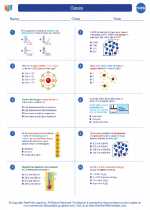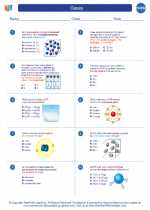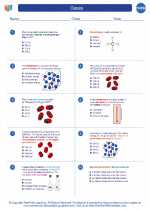Conductivity
Conductivity is a measure of a material's ability to conduct an electric current. In the context of chemistry, conductivity often refers to the ability of a solution to conduct electricity.
Factors Affecting Conductivity
Several factors can affect the conductivity of a solution:
- Concentration: Higher concentrations of ions in a solution generally lead to higher conductivity.
- Temperature: Generally, higher temperatures lead to higher conductivity as more ions are mobile.
- Ionic Strength: Solutions with higher ionic strength tend to have higher conductivity.
Measuring Conductivity
Conductivity is typically measured using a device called a conductivity meter, which measures the ability of a solution to conduct an electric current. The unit of conductivity is often reported in siemens per meter (S/m) or microsiemens per centimeter (μS/cm).
Applications of Conductivity
Conductivity measurements are important in various fields, including:
- Environmental Monitoring: Conductivity measurements can help assess the health of natural water bodies.
- Industrial Processes: Monitoring the conductivity of solutions is crucial in various industrial processes, such as in the production of chemicals.
- Quality Control: Conductivity measurements can be used to ensure the proper concentration of ions in solutions during manufacturing processes.
Study Guide
To understand conductivity better, consider focusing on the following key points:
- Understand the concept of electrical conductivity and how it applies to solutions.
- Learn about the factors that affect the conductivity of a solution, such as concentration, temperature, and ionic strength.
- Study how conductivity is measured using a conductivity meter and the units in which it is reported.
- Explore the real-world applications of conductivity measurements in various fields.
By mastering these concepts, you will have a solid understanding of conductivity and its significance in chemistry and other scientific disciplines.



